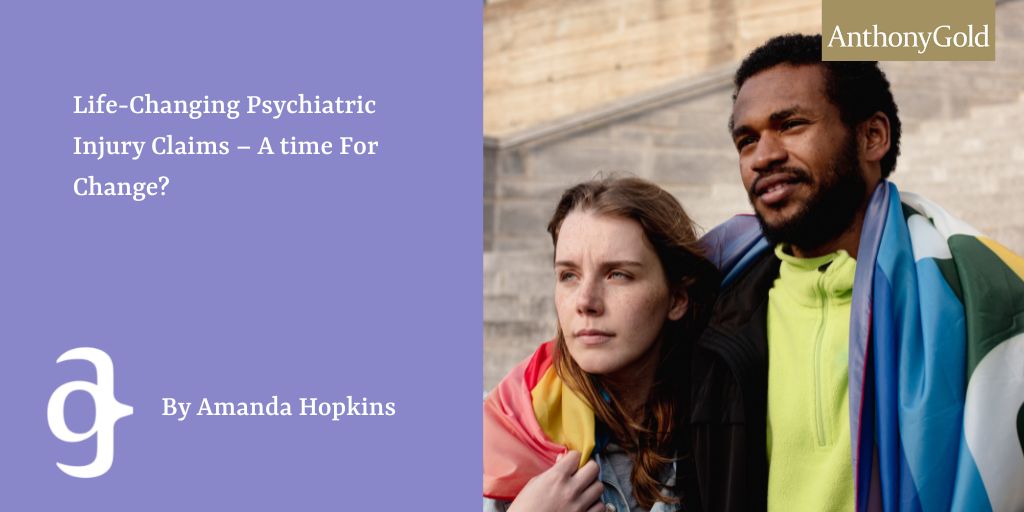Life-Changing Psychiatric Injury Claims – A time For Change?

On 24 March, I will be presenting a course for practitioners with David Marshall on the topic of Litigating Psychiatric Claims. This will be followed later in the year, probably around Christmas time, with a second edition of the practitioner’s handbook of the same name with co-authors Jenny Kennedy and Rehana Azib.
The impact of Grenfell and COVID
There’s a need to update the caselaw and revisit principles which have further crystalised since the first edition was published in 2012. We will also take a look at rescuer claims in the aftermath of the Grenfell Tower disaster and consider whether there is any room for claims as either primary or secondary victim claims for those frontline health workers who participated in and/or witnessed the effects of COVID unfolding. Many of these victims have suffered life-changing psychiatric injuries as a result of what they have experienced and witnessed.
Secondary Victims
The case of Paul & Ors -v- The Royal Wolverhampton NHS Trust [2022] EWCA Civ 12 is also due to be heard by the Supreme Court 16-18 May 2023 which could extend the test of proximity for secondary victim claims. For the purpose of this blog, I am just going to look at professional rescuer claims.
Professional Rescuers
The claims for the emergency responders (the professional rescuers) who attended the scene of the Grenfell Tower disaster are currently on hold. This is to allow the claims of the bereaved, the survivors and the residents to be dealt with first. In total, there are over 1,100 claimants. It will be a test of whether the courts are willing to move beyond the principles set down in Alcock and developed in subsequent case law.
Primary v Secondary Victim claims
As the law currently stands, a professional rescuer will only be able to recover compensation for psychiatric injury if they are in some physical danger themselves and can therefore fall within the category of primary victim. So those going into the burning building to perform their duties should have little trouble in recovering damages (so long as all other aspects of the claims such as causation are fulfilled). But what about those firefighters who manned the water supplies, coordinated and performed resuscitation attempts away from physical danger? They would have witnessed the same horrifying scenes. They would have heard the same screams. Their contribution would have been just as worthy. We know that the tests developed in Alcock were based on public policy – not wanting to open the floodgates and/or not wanting to compensate police officers when relatives of the Hillsborough victims had not been able to recover damages. Is the Grenfell Tower disaster the event which can move the law forward?
Very, very few professional rescuers will be able to satisfy the control mechanisms surrounding secondary victim claims because they will not be able to show adequate ties of love and affection to the victim(s). They are treated the same as a bystander. The current law is that as a secondary victim, the claimant has to prove that a person of reasonable fortitude would have suffered psychiatric injury. If the claimant does not have such ties (like the police did not have in the Hillsborough disaster) then it will be found that the defendant could not have foreseen that the professional rescuer would have suffered psychiatric injury as a result of the defendant’s negligence.
In Alcock, the fact that they were making decisions with public policy in mind was acknowledged by the judges. They contemplated whether the law would ever encompass the bystander (and by extension the professional rescuer). It was considered that the event would have to be of such horror to satisfy the foreseeability test. It’s difficult to imagine something more horrific than the Hillsborough incident – maybe an event involving children? Prolonged? Involving a significant amount of victims? Something on the scale of the World Trade centre disaster? Is the Grenfell Tower disaster such an event?
The Future of Rescuer Claims
Will the Supreme Court feel bound by the control mechanisms laid down in Alcock? There is the danger that the unsatisfactory status of the current law, which bows more to public policy than it does to our more advanced knowledge of psychiatric injury, will be acknowledged but then passed to Parliament to deal with. Statutory change has not been forthcoming in the past 30 years and many a practitioner will mourn the opportunity to effect change. In the meantime, we remain optimistic that positive change is on the horizon.
* Disclaimer: The information on the Anthony Gold website is for general information only and reflects the position at the date of publication. It does not constitute legal advice and should not be treated as such. It is provided without any representations or warranties, express or implied.*
No comments